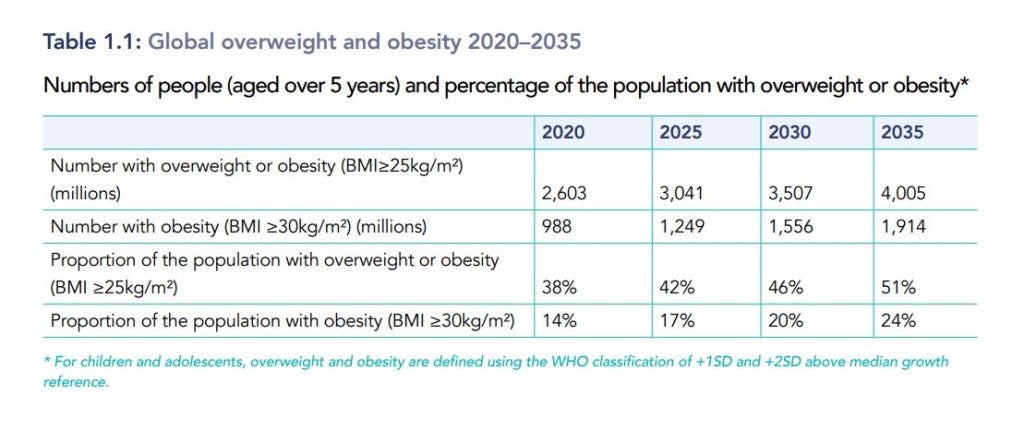
More than half of the global population could be overweight by 2035, with childhood obesity levels doubling compared to 2020, research shows.
The economic impact could reach 3% of global GDP by 2035, or $4.32tn a year, if the curve does not flatten, a study by membership organisation World Obesity Federation found. This is measured by estimating healthcare costs, economic productivity loss and premature retirement or death.
The fifth annual World Obesity Atlas, published today (3 March), suggests 51% of the population will be overweight by 2035, while one in four – around 1.9bn people – will be obese “if current trends prevail”. Those with a BMI of 25 are considered overweight, while 30 and above is seen as obese.
The rate of childhood obesity could double among boys to 208m and see a 125% increase in girls to 175m.
The atlas’s authors said the results were a “clear warning” to policymakers who “need to do all they can to avoid passing health, social, and economic costs on to the younger generation”.
Among its recommendations were increased regulations on food and beverage advertising.
“Governments should take steps to improve environments, using legal frameworks and regulation to protect all, including comprehensive marketing restrictions on foods high in fat, sugar and salt and strong mechanisms to protect the policymaking process from health-harming industries,” it states.

The atlas ranks countries on how prepared they are to deal with the consequences of an unhealthy population. African and eastern Mediterranean countries were ranked the worst prepared while Europe and the western Pacific were considered best prepared.
It predicts North, Central and South America will see the highest economic impact in terms of GDP at approximately 3.7%, while the western Pacific will face the highest costs at $1.56tn.
World Obesity Federation director of science Rachel Jackson-Leach said: “The greatest increases will be seen in low and lower-middle income countries, where scarce resources and lack of preparedness will create a perfect storm that will negatively impact people living with obesity the most.”
It comes as food and beverage companies across the globe face pressure to reduce sugar and improve the health credentials of their products.
In the US, General Mills, Kellogg, Post Holdings have threatened to take legal action over FDA proposals to tighten the use of the word “healthy” on labels. The US Food and Drug Administration FDA recommended the “healthy” claim be reserved for “nutrient-dense foods” that contain a certain percentage of fruit, vegetables, grains, dairy or protein. But said the food giants say the changes would exclude more than 95% of the “major ready-to-eat cereals” from being labelled as healthy.
In Germany, lawmakers are debating regulating advertising “junk” food within earshot of children. The government proposed adverts targeted at children for food and drinks containing “too much” sugar, salt or fat should be banned.
While in the UK, a report last month showed UK manufacturers had fallen short on sugar-reduction targets set six years ago. Campaigners called for legal enforcement of the sugar content of food, especially categories aimed at children.
Professor Louise Baur, World Obesity Federation president, said: “This year’s Atlas is a clear warning that by failing to address obesity today, we risk serious repercussions in the future. It is particularly worrying to see obesity rates rising fastest among children and adolescents.
“Governments and policymakers around the world need to do all they can to avoid passing health, social, and economic costs on to the younger generation. That means looking urgently at the systems and root factors that contribute to obesity and actively involving young people in the solutions. If we act together now, we have the opportunity to help billions of people in the future.”
